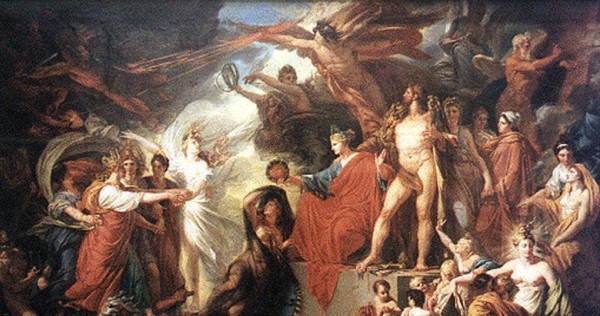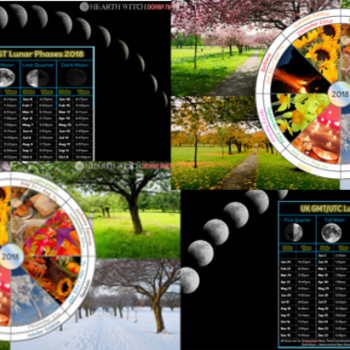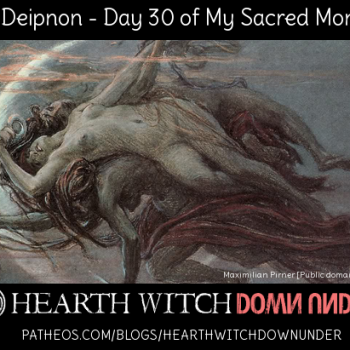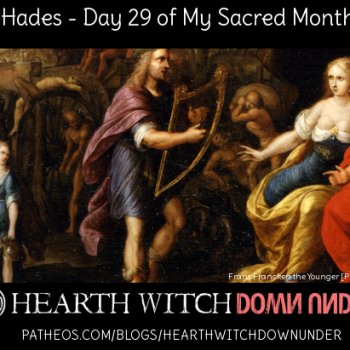In June I read a post by Lettuce Man over on Axe and Plough about the concept of people having favourite deities. I began to write a comment on the post, it got long so instead I began turning it into a blog post. Of course then I got the call about getting a house and stopped writing for a few weeks.
In the post Lettuce Man discusses how people speak of having a or several favourite deities, and how this strikes him as not only odd but perhaps a bit impious and insulting to the Gods. It’s a complex issue though.

The Patron Deities
In modern Paganism there seems to be a lot of emphasis on the idea of having a “patron” deity, or at the least a deity or two who you are especially devoted to, and who you seemingly have a close personal relationship with. Look around enough and you begin to see that the idea of having a patron or two is perhaps seen as an indicator of Real Paganness™. If you don’t have a patron deity, then you are not a Real Pagan, are you?
In some cases it really does seem like many Pagans have a view of the Gods, especially “patron” Gods, that is similar to having an on call doctor or something. These patrons, these favourite deities, are right there, all the time, ready to come when you call and leave when dismissed. Need help opening that jar? Call your favourite strong man Herakles! Need help writing that oral report? Call on Hermes, he’ll help you out no worries.
And it really does smack of impiety, hubris, or whatever word you might have for it. It is insulting to the Gods, to speak of Them and treat Them in such a slavish manner. Like They are pets or toys.
Types of Favouritism
Lettuce Man discusses the idea of the word being used in the same way we shouldn’t play favourites with our kids, our employees, our students and similar. He also adds, after mentioning that we can have favourite colours, foods and the like,
“This way of treating deities – like treating people – is, to me, like reducing them down to these things. While it isn’t intentional, it feels like they’ve less agency and are somehow reduced to mere qualities that aren’t necessarily experienced in reality. Sometimes it comes across as finding favouritism with the idea of a deity, instead of the deity itself. What they can do for us, or what qualities they have on paper which we find preferable.”
What I find interesting though is that in using these two different types of having favourites is that in the one instance he discusses favouritism that happens from a point of authority, but in the other he discusses favourites in the idea of things. While I agree with his assessment, I don’t exactly agree with his base assumption of what people mean by “favourite” and I am fascinated by the fact he puts the Gods into the position of lesser authority, rather than seeing it might go the other way.
A favourite teacher, a favourite boss, a favourite aunt etc. Where we play favourites with those who are in a position of authority above us. Not our things, not our inferiors but our superiors. Humans are egocentric, we will almost always gravitate towards the things, people, beings etc that give us the most pleasure, comfort, good feelings, things, time, attention and more like that. We will also though be more in love with those who give us their best.
Sometimes, depending on what type of person you are, your favourite teacher isn’t the one who is nicest, or prettiest – but the one who teaches the best, the one who gives the best of themselves instead of half-arsing it. Your favourite boss might be the one who is a real hard boss usually, but when someone accuses you of doing something you didn’t do – he is honest, stands up for you, does the right thing for you.
It’s still favouritism of course, but there is a big difference between playing favourites with people who are under your power and choosing favourites between those who have power over you.
Henotheism
But when we get right down to it, I think all of the above really only refers to a small group of Pagans. I would say for the most part, the patron/favourite phenomenon is more an instance of henotheism, or duotheism.
Henotheism is polytheistic belief with monotheistic practice – you believe in the many but worship only one (not necessarily that one though). Duotheism is of course as the name implies, worship of two (belief in others optional), usually one male and one female.
I think that in most cases, the usage of the word “favourite” in reference to deities is in fact more of a henotheistic thing than it is an act of impiety or insult. I am not sure if I have ever used the word favourite in reference to those Gods I am most devoted to, but if I have it is in this way. Hekate is my “favourite” – because, if I had to choose only one deity to worship, honour, offer to, then it would be Her, hands down, no contest, no hesitation.
If I were to use it in reference to all of the small group of deities I find most important, then it would also be in a similar way – though obviously not henotheistic, because They are more than one. Hermes is one of my favourites Gods because if I was only allowed to worship x-number of Gods, then He would be one of the ones I would choose. Without hesitation.
How can I make such choices so easily though? People who cannot answer the henotheist question would of course have trouble understanding how I and others can answer this question. I will try to explain it.
Hekate is part of me, just like my family members are part of me – even those who are gone. But the other Gods (even those I deem most important) are not so deeply entrenched into my very being as Hekate is, they are more like my friends who aren’t family – important, but if they left me forever, it wouldn’t tear out a piece of myself. Whereas losing a loved one like one of my children, or one of my “favourite” Gods, that would tear pieces off me. It would change me in ways unimaginable.
So when it comes to playing favourites with the Gods, it is like playing favourites with children. It is just not my children versus each other, but my children versus other peoples children. I will always love my own more than I love the ones who live down the road from me.
And so I love Hekate more than I love any of the other Gods.
















